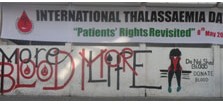A website launched this month will enable thalassaemia patients in the Maldives to find blood donors by sending a single text message, according to developers of the service.
With almost 18 percent of the population registered as carriers, the Maldives has the world’s highest incidence of the crippling genetic blood disorder. Patients diagnosed with thalassaemia major must receive regular blood transfusions and treatment throughout their life.
Currently, over 500 patients with the condition are registered at the National Thalassaemia Centre (NTC) in Male’.
According to the developers of “Blood Donor Online Database”, the new system will ease the burden of thalassamia patients and their families by helping to find willing blood donors quickly and easily.
“By using this unique online directory, available blood donors can be identified quickly and contacted via a simple SMS, saving valuable time for you and your loved ones. Also a simple SMS would enable to register blood donors,” local IT firm, Shell Tech claimed on their website.
The system has been designed in collaboration with national telecom service provider Dhiraagu, which supports the automated SMS system linked to the database website.
Blood donors can register with the database by sending an SMS to 678 with the keyword “REG” and their Identity Card (ID) number.
Meanwhile, thalassaemia patients or their relatives seeking donors can type the allocated atoll code and island name (location), along with their required blood group and send via SMS to 678. This text will be sent to a donor with the needed blood type.
Listed blood donors names will be automatically forwarded to the blood seekers, once registered and will be available for searching on the website.
Each SMS sent through the blood donor service, will be charged at Rf1 (US$0.60).
According to the Chief Executive of Dhiraagu Ismail Rasheed, all revenue raised through the SMS charges will be donated to the NGO, Maldives Thalassaemia Society (MTS).
He added that the company supported the development of the online blood donor database as part of their Corporate Social Responsibility (CSR) program.
The other telecom service provider in the country, Wataniya, will also soon join the initiative allowing its customers to register to the database, Shelltech company noted.
Meanwhile, Thalassaemia Society welcomed the initiative as a “good beginning”, and urged potential donors to register as soon as possible.
On World Thalassaemia Day, 8 May, this year, Minivan News reported on the current challenges facing the country’s thalassaemia patients, as well as inequalities in the services available for them in Male’ and the wider atolls.
The Maldivian Thalassaemia Society contended that authorities have “largely neglected” the rights of local patients, who face numerous challenges to stay alive, especially those in the Maldives’ smaller inhabited islands.
“We see huge inequalities in the provision of medical treatments and services to thalassaemia patients living in the islands and services available from the centre established by the government in Male.”
Even though the government has arranged for blood transfusions on the islands, the MTS claimed that for various reasons, the service and necessary medications are unavailable, forcing patients to cover the high costs of travelling to other islands or the capital in order to get blood transfusions. These transfusions are often a matter of life or death for patients.
In response to multiple concerns raised by the group, the government has decided to revamp the system by joining the Nastional Thalassamia Center and the National Blood Transfusion Center to create the “Thalassaemia and Other Hemoglobinopathy Center” – which needs to established under the Thalassamia Control Act.
Health Minister Dr. Ahmed Jamsheed told local media earlier this month that all necessary administration work had now been completed and the centre would soon start functioning. He said at the time that the utmost importance was being given to ensure Thalassaemia patients from the islands receive free health care.
 (0)Dislikes
(0)Dislikes (0)
(0)